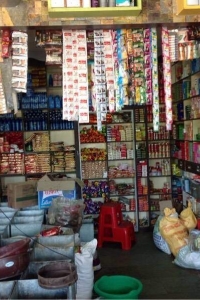
Goods worth lakhs of rupees were lying unsold in Balchand Kaka’s grocery store. During his father’s time, in the absence of severe market competition, it had boasted of a wide clientele. Balchand Kaka had used every trick in the trade to make his shop popular – glow signs and gift coupons to enhance sales even as he maintained a low-profit margin. The sales graph, however, refused to curve upwards, convincing him that the stars and their planetary influences had more to do with the matter than anything else. But even as he blamed Saturn for his downslide, he knew that the Shiva temple blocking the façade of his shop was partly responsible.
During the dull hours, his fellow shopkeepers trickled in on the pretext of buying paan masala and sympathized with his predicament in a rather insincere way: “Kaka, your shop has the best location, only if this obstruction…wonderful then, no?”
Kaka was a god-fearing man who resisted rising to such bait. He feared that a word against the Lord’s presence, against the temple constructed almost two decades ago on municipal land just in front of his shop, would unleash divine wrath upon him. So he let the remark pass without establishing eye contact with the speaker: “Each mortal has his own kismet,” he replied solemnly, “one cannot fight one’s stars…:"
Every morning, before opening the shop, he offered puja at the temple with marigold flowers and fervently prayed for a reversal in his fortunes. “Lord, you know everything. My needs are simple. But I must earn enough to marry off my two grown-up daughters. Look after this devotee of yours, my Lord.”
Whenever he had nothing else to do or was tired after hollering at his assistant, Ramu, to keep the lids on the containers and prevent cockroaches and rats from damaging the stock, he remembered that his professional ascent depended on the removal of the practical glitch. He grew firmer in his conviction after a new customer chanced upon his shop and claimed to be pleasantly surprised by his discovery.
“Why can’t the temple be razed to the ground just the way hawkers were evicted from the pavements recently?” Kaka pondered one evening when his day’s business had fetched him less money than the amount earned by the roadside bhelpuri vendor. But the impure thought made him feel guilty.
On a sultry afternoon, when the town was reeling under a power cut, Kaka removed his cotton vest and ordered Ramu to fan him as factotums did for erstwhile maharajahs and feudal lords. Respite from the heat came in the form of an important piece of information rather than from Ramu’s languidly moving palm-leaf fan. A circular issued by the municipality sought the co-operation of local shopkeepers in broadening the thoroughfare for reasons of safety. In the list of measures, the relocation of the temple figured prominently. Kaka’s joy was limitless, but he maintained an impassive façade as if he wasn’t happy about the Lord’s proposed relocation. His rivals, realising that Kaka’s shop would now become visible from the road and lure their customers away, were secretly dismayed.
In less than a fortnight’s time, the decision was ratified at the highest level and the logistics worked out for carrying out the operation. The actual work was slightly delayed by the fear of labourers that the demolition drive, involving the destruction of the Lords’ abode, would invite divine retribution in the form of leprosy, paralysis or death.
To avoid public outrage, the authorities carried out the demolition drive during the ungodly hours after midnight, deploying a contingent of grossly overpaid vagrant sweepers from a tribal community sufficiently high on hooch to forget what they had been roped in to destroy.
The next morning, Kaka arrived at his shop earlier than usual, bubbling with the kind of excitement he had not experienced since his daughters were born. Not a trace remained of what had stood on the site of the temple the day before. Not even rubble.. Beams of sunlight, with dust motes trapped in them, now fell directly on his yellow rolling shutter, painted with the logo of the elephant brand of mustard oil of which he had once been a wholesale dealer. Not having enjoyed so much space his shop, he felt he was in a playground. Hopping to the other side of the road, oblivious to speeding auto-rickshaws and bikes, he gazed at his shop, trying to gauge how it would look to customers from that distance.
Neighbouring shop-owners gathered and passed comments, eyeing his shop as it were the bust of a pubescent girl. Some of them approached him to say, “If any individual has benefited from this clean-up, it is Kaka. Look at his shop front now. It is visible from a distance.”
Kaka said nothing. A mild, “Yes-I-know” smile did, however, make his chapped lips twitch in silent acknowledgment of their unanimous verdict. When Ramu arrived, Kaka tossed him a two-rupee coin and ordered him to buy a lemon, tie it with a string of red chillies and hang it at the entrance.
In the short puja he offered to the post-card size photo of the Lord after opening the shop, he thanked Him for his good fortune. He knew the Lord would be installed in a year’s time at a different place, near the auto stand, in more resplendent glory. He read this change as the Lord’s Will. “It is only for me that you are changing abode. Otherwise, no power on earth could make you budge an inch, dear Lord. Keep protecting me the way you have done all these years.”
When his trader friends tricked in to congratulate him and ask for a treat of rosogollas, he was the picture of saintly humility, cautioning them that there would be better occasions to celebrate and have sweetmeats. This one did not merit it.
“Do not annoy the Lord this way," he admonished. “He keeps tabs on our speech and actions. His stick makes no sound when it hits you.”
In a remarkably short span of time, Kaka’s business picked up. Lots of customers wondered when the ‘new’ shop had come up. It sold goods at reasonable rates and provided insect-free pulses. In six months, Kaka had earned as much as he had saved in the last six years. He stocked everything a customer could ask for including obscure brands. His credo was not to disappoint a single customer.
A group of pilgrims was planning to go to Baidyanath Dham from Kaka’s locality. Since it was being organised at the fag-end of the month when business was slack, he thought this opportunity was ripe for thanking the Lord for good luck. Dressed in saffron robes, he arrived at the shop after taking leave of his family.
“Don’t worry, Babu, I promise not to disappoint you on any count,” Ramu assured him, touching his feet.
“I know that. You are like a son to me. Jai Bholey Baba!”
Having issued his instructions, Kaka boarded the AC bus waiting on the main road just opposite his shop, while Ramu deposited his luggage in the luggage hold.
When he returned after a successful four-day yatra, late in the night, he narrated the highlights of the trip to his wife. He said they’d make the pilgrimage together to thank the Lord if their elder daughter’s marriage was solemnised within a year. He spoke of the nice Bania family he had met during the pilgrimage and their willingness to consider his daughter as a prospective partner for their son. When he inquired about the shop, Kaka’s wife informed him that every night by nine, Ramu had been depositing the keys of the shop with her and had kept her posted about the volume of sales for the day.
Kaka went to the shop early in the morning, juggling the keys in hands. He had not only skipped breakfast, but had postponed meeting his daughters. He pulled up the shutters, charged with the desire of counting hard cash – an activity he hadn’t been able to indulge in for some days.
What he saw nearly felled him. The store was empty. Not a single sack remained. Jars and tins lay upturned on the floor. The cash box gaped open. Not a single rupee remained in it. A 40-watt bulb was aglow in the godown. He now began to suspect who might be responsible for this state of affairs: his trusted Ramu. Shattered, he collapsed on his haunches and held his tonsured head in his trembling hands. On a conservative estimate, he’d have to shell out five lakhs to pay off his creditors.
Hearing his loud wails, the next-door retailers hurried in to see what was wrong. They found Kaka, eyes bloodshot with weeping, looking for a shoulder to lean on.
As the hours ticked by, Ramu’s absence made it clear who had planned and executed this betrayal. Other shopkeepers informed him that in the last few days, they had noticed goods being despatched in motor vans and rickshaws, but had seen no reason to be suspicious. “We thought with your new-found prosperity, you were getting and delivering bulk orders, Kaka.”
Their suggestions on how to catch the culprit fell on deaf ears. Kaka continued to mumble. “What did I do wrong, Bholey Baba?” Why this punishment? I’m ruined forever. I’ll have to sell the shop to clear my debts. How will I marry off my daughters? What do you want to teach me through this?”
He furnished a litany of woes and wallowed in self-pity, his wails rising to a crescendo. Meanwhile, a woman, beating her breast and uttering loud cries of lament, was seen running towards the grocery shop. Kaka looked up, having identified the shrill voice.
“Hai, Hai! Suno ji, we are ruined, our Badki is not at home. Her suitcase and clothes are missing. Left this letter…”
Someone from the crowd that had gathered out of curiosity offered him poor consolation.
“Calm down, Kaka, take a hold on yourself. There’s a mystery and purpose in everything He does. His stick makes no sound when it hits... Perhaps, this was also the Lord’s Will…”
*****
About the Author







Comments